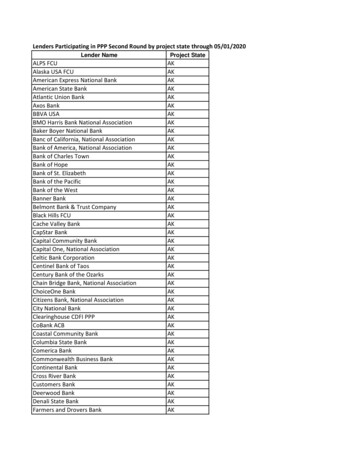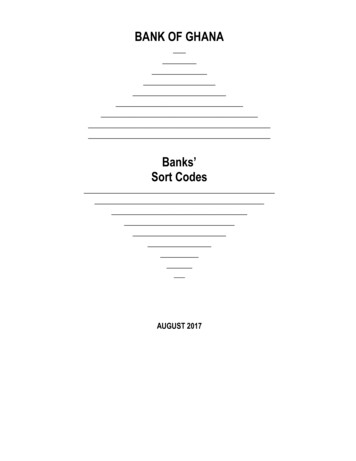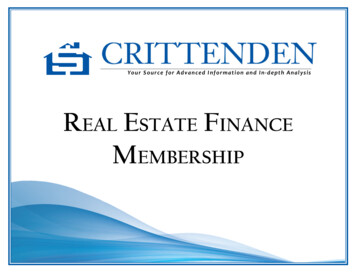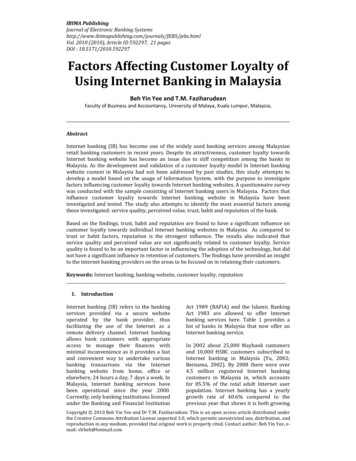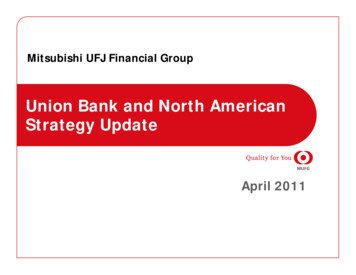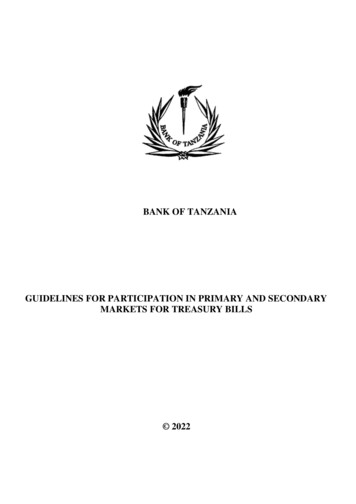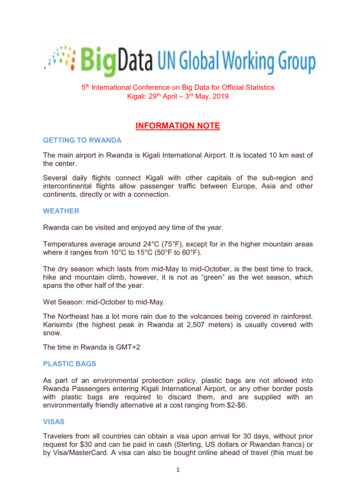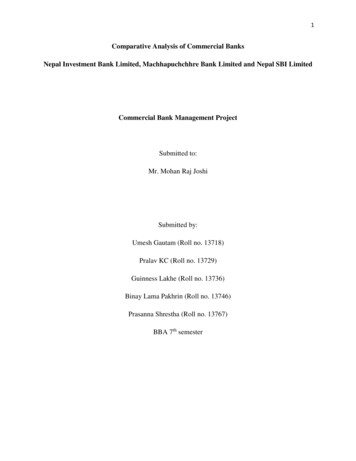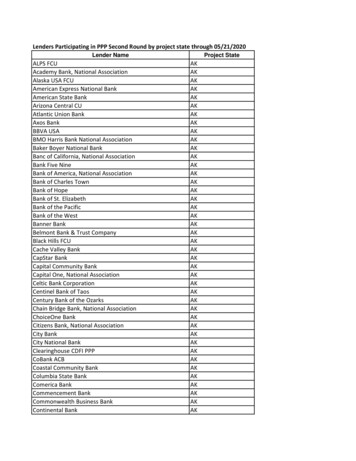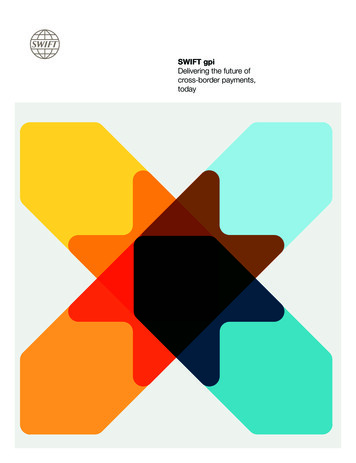
Transcription
RESPONSIBLEINVESTMENTGOVERNMENTPENSION FUNDGLOBAL/2016No. 03
Responsible investment 2016 Government Pension Fund Global
Our missionis to safeguardand build financialwealth for futuregenerations
Contents201612INTRODUCTIONSTANDARD SETTING1.1 CEO of Norges Bank InvestmentManagement 41.2 Main pillars 62.1 Principles and expectations 141.3 Purpose 112.3 Research and data 22Responsible investment 2016 Government Pension Fund Global2.2 Standards and practices 17
34OWNERSHIPRISK MANAGEMENT3.1 Voting 326.1 Risk monitoring 683.2 Interaction with companies 426.2 Risk-based divestments 763.3 Environmental investments 586.3 Ethical exclusions 84
Yngve Slyngstad4Responsible investment 2016 Government Pension Fund GlobalChief Executive Officer ofNorges BankInvestment Management
INTRODUCTION1.1Standards forthe long termGood corporate governance, sustainable business practices and well-functioningmarkets are in the fund’s long-term interest. Appropriate and consistentstandards across sectors and markets are important in this regard.We are a long-term investor with a mission to safeguard our investments. We seek to promote andimprove global standards for good corporate governance, long-term business practices, and sustainablemarket outcomes. 2016 saw a number of policy developments we welcome as an investor. It was the firstyear the updated G20/OECD Principles of Corporate Governance and UN Sustainable Development Goalswere in effect. In 2016, we published our human rights expectations towards companies.We are a large global investor with minority ownership in almost 9,000 companies. Our ownershipactivities build on international standards. In 2016, we expanded the publication of our voting intentions,and saw a significant move in Sweden in support of our position on individual count in board elections.We believe our ownership efforts on corporate governance will contribute to higherreturn over time.We considerlong-term investmentrisk across sectorsand marketsWe consider long-term investment risk across sectors and markets. The climatechallenge stands foremost as a future risk of unknown magnitude. We haveenhanced our analysis of portfolio carbon emissions, funded research projects, andwe removed coal companies and electricity producers with high usage of coal fromthe fund. In 2016, we improved our data for a range of environmental, social andgovernance risks.This publication presents an overview of Norges Bank Investment Management’s responsible investmentactivities in 2016. We hope you will find it useful to reflect on the breadth of challenges we face as aninvestor.Oslo, 7 March 2017Yngve SlyngstadCEO of Norges Bank Investment Management5
6Introduction Responsible investment 2016 Government Pension Fund Global
INTRODUCTION1.2Main pillarsSTANDARD SETTINGOWNERSHIPWe aim to contribute to the development ofstandards and practices that will serve the longterm interests of the fund. Our principles,expectations and positions build oninternationally recognised standards. We makesubmissions and prioritise corporate governanceand sustainability topics in defined initiatives tocontribute to improved disclosure, standards andpractice development. Research increasesunderstanding of factors that can affect futureinvestment risk and return. We promote researchto inform market standards and practices, datadevelopment and our own responsibleinvestment priorities.We are an active owner and use our votingrights to safeguard the fund’s investments. Thisincludes voting to promote sustainabledevelopment and good corporate governance.We aim to vote at every shareholder meeting.Information from our portfolio managers isintegrated into our voting decisions. As a large,long-term investor, we engage directly withcompanies’ board and management. Ourownership efforts are based on our principles,expectations and positions. We emphasisegovernance and sustainability engagementtopics we deem relevant and follow up onspecific issues as they arise. Through ourenvironmental investments, we dedicate capitalto environmental technologies.RISK MANAGEMENTWe monitor and analyse risks fromenvironmental, social and governance issuesas part of our overall risk management. Theseefforts cover many topics that are alsoaddressed through standard setting andownership. Our approach means that weperform general assessments of topics andsectors on an ongoing basis, before going intospecific issues in greater depth. To support thiswork, we emphasise development of high-qualitydata and corporate disclosure. We continue toenhance our databases of non-financial data. Riskassessments may lead to adjustments to theportfolio and divestments. Our divestmentsfollow from the application of our integratedrisk model.7
v8Introduction Responsible investment 2016 Government Pension Fund Global
anies assessedwithin focus areas11,2949848Shareholdermeetings voted atPercent ofshareholdermeetings voted atIntegrated voting aspercentage value ofequity portfolio23363.712.4Board levelmeetingsEnvironmentalinvestments.Billion kronerReturn onenvironmentalequity investments.Percent5,714,2992364Portfolio carbonemissions.Tonnes CO2 equivalentsNew divestmentsNew exclusions1.29
10Introduction Responsible investment 2016 Government Pension Fund Global
INTRODUCTION1.3PurposeOur mission is to safeguard andbuild financial wealth for futuregenerations. We manage the fundresponsibly in order to supportthe investment objective of thehighest possible return with amoderate level of risk. Responsibleinvestment is integrated into ourinvestment strategy.The fund is owned by the people of Norway.Norges Bank Investment Management’smission is to safeguard financial wealth forfuture generations. Our management mandaterequires us to integrate responsible investmentinto the management of the fund.LONG-TERM RISK AND RETURNWe have an inherently long investment horizon.The fund is invested across many markets,sectors and countries in order to capture globalvalue creation and diversify risk. Well-functioning,legitimate and efficient markets, as well as goodcorporate governance and sustainable businesspractices, are in the fund’s interest.Responsible investment management supportsthe objective of the fund. We see it as a matterof managing the nation’s financial wealthresponsibly and efficiently. Our investmentmanagement takes account of environmental,social and governance issues that could have asignificant impact on the fund’s performanceover time. We seek to further the long-termeconomic performance of our investments andreduce financial risks associated with theenvironmental, social and governance practicesof companies we have invested in.OUR PRIORITIESThree pillars underpin our responsible investmentefforts: standard setting, ownership and riskmanagement.We have published a set of expectations,positions and voting guidelines to communicateour views on a range of corporate governanceand sustainability matters. These form the basisfor our ownership efforts. We aim to contributeto the development of standards and practicesacross markets and sectors that will serve thelong-term interests of the fund. We makesubmissions and interact with international11
RECOGNISED PRINCIPLES AND STANDARDSNorges Bank Investment Management recognises a set of key international principles andstandards. We base our practice on these and participate in their further development.The principles and standards published by the OECD and the United Nations are voluntary, nonstatutory recommendations that express expectations for good corporate governance and soundbusiness practices when it comes to environmental, social and governance issues. We expect thecompanies we invest in to strive to observe these principles and standards.12The G20/OECD Principles of Corporate Governance mainly concern effective corporategovernance, such as shareholder rights and key ownership functions, equitable treatment ofshareholders, disclosure and transparency, and the responsibilities of the board. The principlesform a natural starting point for our own positions and interaction with companies and otherorganisations.The OECD Guidelines for Multinational Enterprises are a set of government-endorsedrecommendations for companies that operate internationally. The aim is to support sustainabledevelopment through responsible business conduct, trade and investment. The voluntary natureof the guidelines means that compliance cannot be legally enforced, but there is an expectationthat companies will apply the guidelines to the extent that these are applicable to their business.Companies themselves are to assess how this can best be achieved.The United Nations Global Compact sets out ten general principles derived from the UniversalDeclaration of Human Rights, the ILO Declaration on Fundamental Principles and Rights at Work,and the Rio Declaration on Environment and Development. Among other things, the principlesrequire companies to respect human rights, avoid complicity in abuses of these rights, upholdthe freedom of association and the right to collective bargaining, and eliminate all forms of forcedlabour, child labour and discrimination in the workplace.The United Nations Guiding Principles on Business and Human Rights are a global standard. Theprinciples were unanimously endorsed by the United Nations Human Rights Council in 2011. Theguiding principles encompass three pillars outlining roles and responsibilities for states andbusinesses with regard to human rights: the state duty to protect human rights, the corporateresponsibility to respect human rights, and access to remedy for victims of adverse impacts.Introduction Responsible investment 2016 Government Pension Fund Global
INTRODUCTIONbodies, regulators, initiatives, companies,industry partners, academics and ourstakeholders. We prioritise governance andsustainability topics in defined initiatives toadvance disclosure, standards and practicesover time.We support academic research to improve thetheoretical and empirical foundations for ourwork. This, in turn, can inform the developmentof standards and practices, data developmentand our own responsible investment priorities.In our analyses, we depend on data onenvironmental, social and governance topics.Consistent and high-quality non-financialdisclosure is therefore of particular interest tous. The development of databases of suchinformation is also a priority. Additionally, wehave chosen to concentrate on corporatepractices and disclosure within selected areasof sustainability in our work: children’s rights,climate change and water management. Thishas given us a foundation for continued effortsto assess company strategy within these topics.Our ambition is to vote at every shareholdermeeting of companies we have invested in.Our ownership strategies are premised ongood corporate governance and wellfunctioning boards. With holdings in around9,000 companies, we cannot have extensive orin-depth knowledge of every company in theportfolio. We emphasise governance andsustainability engagement topics we deemrelevant and follow up on specific issues asthese arise. We also integrate companyspecific investment knowledge andconcentrate further on topics and companieswhere we believe there is the greatestpotential to safeguard value for the fund. Wemake additional investments in environmentaltechnologies through our environment-relatedmandates.1.3Managing environmental, social andgovernance risks in the portfolio is an importantaspect of safeguarding our investments. Wetake a systematic approach to risk monitoring.Our approach means that we perform generalassessments of topics and sectors on anongoing basis, before going into specific issuesin greater depth. Our risk monitoring effortscover many topics that are also addressedthrough standard setting and ownership. Wemay divest from individual companies followingrisk assessments.This publication concentrates on responsibleinvestment management within the mandate’sreturn objective, as operationalised by NorgesBank Investment Management. The Ministry ofFinance has also issued Guidelines forObservation and Exclusion from theGovernment Pension Fund Global. Theseguidelines are part of the formal framework forNorges Bank’s management of the fund and areethically motivated. A separate andindependent Council on Ethics has beenestablished by the Ministry of Finance to giveadvice based on these guidelines. Oneexception is the 2016 coal criterion. NorgesBank can decide to exclude companies underthe 2016 criterion independently of anyrecommendation from the Council. In ourresponsible investment management, we aimto contribute to coherent and consistentoperationalisation of the guidelines.13
Principles andexpectationsWe have published a set ofprinciples, expectations,guidelines and positions informingour responsible investmentmanagement. We develop theseon an ongoing basis, and they formthe basis for our priorities andactivities.14The Executive Board has laid down principles forresponsible investment management at NorgesBank. Norges Bank Investment Management, inturn, expresses expectations and priorities inmultiple forms, such as expectations directed atcompanies, voting guidelines and positions onsingle issues.EXECUTIVE BOARD PRINCIPLESThe principles clarify that responsibleinvestment management is to support theobjective of the fund by furthering the longterm economic performance of ourinvestments and reducing financial risksassociated with the environmental and socialpractices of companies in which we haveinvested. The principles constitute theExecutive Board’s guidelines for Norges BankInvestment Management’s responsibleinvestment management.EXPECTATION DOCUMENTSSince 2008, we have published expectationdocuments to support our ownership efforts.The purpose of our expectation documents isto set out how Norges Bank InvestmentManagement, as a financial investor, expectscompanies to address specific topics in theirbusiness practices. The expectations form partof a broader set of strategies and activities weemploy within our responsible investmentmanagement. The expectations serve as astarting point for our interaction withcompanies on climate change strategy, watermanagement, human rights and children’srights. The documents cover both relevantrisks and opportunities facing companies.Our expectations are aimed primarily atcompany boards. Our underlying expectationis that boards assume responsibility forcorporate strategy concerning relevantsustainability issues. The board shouldStandard setting Responsible investment 2016 Government Pension Fund Global
STANDARD SETTINGeffectively guide, monitor and review companymanagement. We analyse risks andopportunities to investments. In this, we dependon high-quality information from companies.Another important premisefor our work is thereforeappropriate companyOur expectations are disclosure on theaimed primarily at expectation topics, in linewith applicable reportingcompany boards standards and initiatives.New expectation document on human rightsIn February 2016, we published an expectationdocument on human rights. The UN GuidingPrinciples establish a normative basis forcompany strategy on human rights. Theprinciples also provide a reference point forbusinesses in understanding what humanrights are, how their own activities andbusiness relationships may affect these, andhow to ensure that businesses address the riskof adverse impacts on human rights.In our expectations, we emphasise howcompanies should respect human rights in theirown operations, as well as in supply chains andbusiness relationships. Respecting humanrights is, in our view, an inherent part of goodbusiness practice and risk management. Theresponsibility to respect human rights appliesto all companies. It is the duty of companiesthemselves to decide how and to what extentthe UN Guiding Principles and other relevantguidelines apply to their operations.Our expectations imply that companies shouldmake a commitment, and, where relevant,define a strategy and adopt policies regardingthe respect of human rights. We also expectcompanies to have adequate processes inplace to assess and address the risk of adverseimpacts from their operations on human2.1rights. They should publicly discloseinformation on their human rights strategy,policies, risks and impact assessments, aswell as engagement with stakeholders andpolicy makers.Information on human rights can be sensitivefor both operations and affectedstakeholders. We nevertheless encouragecompanies to be transparent about thedilemmas they face, and the priorities theyset, in their efforts to respect human rights.VOTING GUIDELINESWe have developed guidelines as thefoundation for our voting decisions. Theseguidelines provide companies with theoverarching rationale for our decision-makingwhen we vote. The guidelines state, amongother things, that we will vote at allshareholder meetings unless there aresignificant practical obstacles to doing so, andthat we will publish our voting decisions. Weaim to vote in ways that further the fund’slong-term interests. As a responsible investor,we emphasise long-term value creation,sustainable business practices, boardaccountability, shareholder rights, equaltreatment of shareholders and transparentcorporate communication.POSITION PAPERSTo support our ownership activities, we issueposition papers that publicly clarify our stanceon selected corporate governance issues. Ourpositions have a bearing on questionsconcerning individual companies as well asthe development of wider market practices.15
16Standard setting Responsible investment 2016 Government Pension Fund Global
STANDARD SETTING2.2Standards andpracticesThe development of principles andstandards for market participants isimportant for the management ofthe fund. We engage in dialogue,make submissions and launchinitiatives to promote goodpractices and well-functioningmarkets.As a market participant, Norges BankInvestment Management aims to contribute tothe development of standards that will servethe long-term interests of the fund. Wepromote sound market practices throughinteraction with regulators, other standardsetters and market participants. We alsoparticipate in relevant international fora anddiscussions of issues concerning the formationand setting of standards. We prioritise selectedgovernance and sustainability topics throughspecific initiatives across the portfolio. Theseinitiatives are typically closely related to ourownership or risk management activities.2016 SUBMISSIONS AND INTERACTIONIn 2016, we submitted nine responses toconsultations related to responsible investmentmanagement. All submissions are published onour website: www.nbim.no.International standardsWe engaged with the OECD on various topicsconcerning its Guidelines for MultinationalEnterprises in 2016. The OECD undertakes workto create practical sectoral applications of therecommendations in the guidelines. We aim tosupport these efforts and continued to providefeedback to the OECD Secretariat through ourparticipation in the OECD Advisory Group onresponsible business practices and the financialsector. The OECD guidelines focus on instanceswhere companies themselves cause orcontribute to an adverse impact, or where theyare linked to such impacts, most oftenexemplified in a supply chain context. Therelationship between an investor, throughownership of shares bought in a secondarymarket, and an investee company, isfundamentally different from supply or othervalue chain relationships. The OECD projectseeks to provide further guidance on aspects ofthis topic.In August, we responded to a PRI consultationon a sustainable financial system, principles andimpact. In our submission we supported thePRI’s ambition to promote research into thesustainability of financial markets. Such anundertaking may over time provide a basis fornew insights into the relationship betweensustainability and investment risks and returns.We also emphasised that we, as an investor,welcome the Sustainable Development Goals.These goals may give rise to potentialinvestment opportunities and changes toinvestment risks. We argued against measuringinvestor impact towards these high-level policygoals through the PRI reporting framework.Investors may benefit from, and seek ways topromote sustainable development, but they arenevertheless not accountable for ensuring thewell-functioning of markets or for outcomes notdirectly related to their own activities.In September, we provided feedback on theFinancial Stability Board’s proposed peer reviewon the implementation of the G20/OECDPrinciples of Corporate Governance for financialinstitutions. Norges Bank InvestmentManagement submitted a statement in supportof the peer review. We suggested that thereview emphasises the expertise of independentboard members, the issue of the combination of17
the roles of chairperson and CEO, boardmembers’ time commitments, and the board’saccountability to shareholders.Market, industry or topical standardsWe also work with standards covering specificsectors, markets and topics.18Some standards are new or under development.Throughout 2016, we interacted repeatedly withthe Financial Stability Board’s Task Force onClimate-related Financial Disclosures. Forinvestors, the development of an overarchingframework for the reporting and assessment ofclimate risks is a priority. We believe materialityto be the appropriate starting point for climaterelated financial disclosures. In our submission inMay, we wrote that we favour a sectoralapproach to many disclosure recommendations.This may capture sector-specific complexitiesbetter and would avoid unnecessary generaldisclosure requirements. Finally, we expressedour support for more research into financialclimate-related risks, and noted that there maybe differences in the sources, timing andchannels of such risks for different parts of thefinancial sector.An example of an existing global disclosureinitiative we support is CDP, formerly known asthe Carbon Disclosure Project. In 2016, weengaged with other institutions to improve therelevance of water reporting. We participated in aworkshop with institutional investors andcompanies to discuss a revision of the currentCDP water questionnaire so that it alsoaddresses sector specificities. Furthermore, wepresented our approach to the water issue atWorld Water Week in Stockholm, where weemphasised the relevance of appropriate nonfinancial reporting by companies, particularly onthe topics of water management and climatechange strategy.Standard setting Responsible investment 2016 Government Pension Fund GlobalBoard independence is a topic we haveemphasised over time. We raised this issue withthe German Government Commission onCorporate Governance in 2016. We suggestedthat the corporate governance Kodex shouldspecify recommendations for howindependence of individual supervisory boardmembers should be assessed and disclosed.We also suggested that the code specifies howmany board members should qualify asindependent. The commission issued aconsultation on proposed amendments to theKodex, capturing independence and othercorporate governance improvements.In 2016, we were invited to be part of theJapan Government Pension Investment Fund’snewly established Global Asset Owners’Forum. The Japanese fund established theforum as a venue for the exchange ofknowledge and opinions on responsibleinvestment with non-Japanese asset owners.In November, we helped organise a companyseminar in Tokyo with around 40 participatingcompanies. The objective of the seminar wasto communicate our human rightsexpectations to companies. The seminarincluded a panel discussion on responsibleinvestment and investor expectations betweenrepresentatives of Japanese companies, PRIand Norges Bank Investment Management.We are a foundation sponsor of the AsianCorporate Governance Association, whichaims to promote effective corporategovernance practices in Asian markets andcompanies. During the year, we provided inputfor the association’s advocacy work andattended meetings where specific topics,markets and actions were discussed.
STANDARD SETTINGAs part of our efforts to support thedevelopment of corporate governancepractices in emerging markets, we haveentered into a sponsorship contract tosupport the African Corporate GovernanceNetwork. 2016 was the first year of the threeyear contract. The network was established in2013 and is still in a build-up phase. It servesas a continent-wide umbrella network fornational institutes of board directors and iscommitted to the improvement of corporategovernance practices through codification,education and capacity building. We supportthe network’s administrative functions.Financial market regulationAs a long-term investor in listed instruments,the fund is affected by the regulation offinancial markets. The fund benefits fromcorporate transparency on relevant nonfinancial matters, which may also contribute toefficient price discovery.In 2016, we addressed financial marketregulation and sustainability disclosure invarious contexts. Webelieve consolidation andIn 2016, we harmonisation ofaddressed financial sustainability reportingaround well-founded andmarket regulation and recognised frameworks aresustainability in the interests ofcompanies and investorsdisclosure in various alike. To encourage globalcontexts alignment of reportingrequirements,supranational and national regulators mayusefully refer to and, as appropriate, build onthe two prevailing sustainability reportingstandards, the Global Reporting Initiative andthe Sustainability Accounting Standards Boardwhen setting their requirements. This wouldaid standardisation, contribute to2.2comparability, and reduce the reporting burdenfor companies and due diligence complexityfor investors.In February, we submitted a consultationresponse on the Singapore Stock Exchange’sopen review of the proposed amendments tosustainability reporting rules for primary-listedissuers. We supported the exchange’s initiativeto strengthen sustainability reportingrequirements and encouraged enhancedtransparency. We welcomed the introductionof the ‘comply or explain’ model for disclosure.This will support wider adoption ofsustainability reporting across issuers, but givecompanies flexibility to report on relevant andmaterial sustainability challenges andopportunities specific to their sector orbusiness model. We supported theamendments outlining the board’s overallresponsibility for strategy and reporting,including on sustainability matters.In June, we submitted comments on the WorldFederation of Exchanges draft guidance onsustainability reporting. In markets withoutsufficient regulatory sustainability reportingrequirements, we encouraged stock exchanges toinclude such reporting as part of their listingrequirements to foster improved marketpractices. We referenced the usefulness of theIntegrated Reporting framework in supportingconcise and relevant reporting of material factors.In July, we submitted comments to the USSecurities and Exchange Commissionspecifically on the disclosure of sustainabilityinformation. We underlined that suchdisclosure can be important for informedvoting and investment decisions. Wehighlighted our preference for a principlesbased approach underpinned by materiality forcreating a disclosure framework flexible enough19
to address evolving issues. We reiterated ourview that the board of directors has the overallresponsibility for reporting, while suggestingthat the commission could provide furtherguidance to companies on assessing materialsector-specific risks.INDUSTRY INITIATIVESOur ambitions with the initiatives are over timeto advance relevant standards, the informationavailable to investors, and industry practicesconcerning governance and sustainabilitytopics. In 2016, we addressed such topicsthrough three initiatives.SUBMISSIONS20RecipientTopicSingapore Exchange LimitedResponse to the consultation paper on sustainabilitySubmitted04.02.16reporting: comply or explainTask Force on Climate-relatedFinancial DisclosuresConsultation on phase 1 report02.05.16Financial Services Agency ofJapanResponse to request for comments on issues21.06.16World Federation of ExchangesResponse to the open consultation on the federation’sconcerning constructive dialogue between companiesand institutional investors24.06.16guidance and recommendationUS Securities and ExchangeCommissionResponse to the commission’s concept releasePRI AssociationResponse to the PRI consultation on a sustainable15.07.16on business and financial disclosure required byRegulation S-K18.08.16financial system, principles and impactSecretariat to the FinancialStability BoardPeer review on corporate governance09.09.16Natural Capital CoalitionFinance Sector Supplement to the Natural Capital09.12.16ProtocolGerman Government CorporateGovernance CommissionAmendments to the Government corporategovernance KodexStandard setting Responsible investment 2016 Government Pension Fund Global14.12.16
STANDARD SETTINGEnvironment and mining data initiativeIn 2014, we launched a mining data initiative toexpand and improve non-financial data on thissector in a consolidated database. ColumbiaUniversity continued to work on building thisdatabase in 2016. Such information is notreadily available. Norges Bank InvestmentManagement has therefore invited miningcompanies, industry experts and miningindustry associations to contribute to thedevelopment of the data. The database hasbeen built in an open-source format and will bemade available for further research. Thed
enhanced our analysis of portfolio carbon emissions, funded research projects, and we removed coal companies and electricity producers with high usage of coal from the fund. In 2016, we improved our data for a range of environmental, social and governance risks. This publication presents an overview of Norges Bank Investment Management's responsible investment activities in 2016. We hope you .
